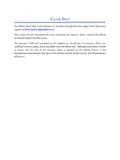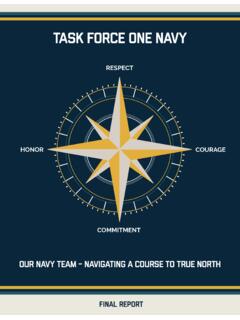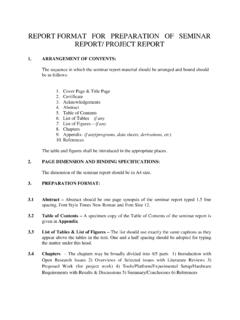Transcription of SUMMARY REPORT ON SEMINAR PROCEEDINGS - OECD
1 REGIONAL WORKSHOP AND SEMINAR ONEVALUATION CAPACITY DEVELOPMENT FORAFRICAJ ohannesburg, 25-29 September 2000 SUMMARY REPORT ON SEMINARPROCEEDINGSP repared by the African Development Bank (AfDB)Agenda item 733rd Meeting22-23 November The Bank organised, with the support of the Development Bank of Southern Africa (DBSA), theWorld Bank, UNICEF, IDRC and the Swiss Development Agency (SDC), a workshop and seminaron evaluation capacity development in Africa (25-29 September 2000) in Johannesburg, SouthAfrica. The workshop and SEMINAR were a follow-up to the ADB sponsored SEMINAR held in Abidjanin November 1998 which brought together teams of senior officials of 12 African countries and 21 International Development Assistance Agencies and where participants acknowledged thatmonitoring and evaluation capacity development in Africa is integral part of a broader initiative forgood governance and effective public resources The specific objectives of the workshop and SEMINAR were the following.
2 (1) Creating the demand and capability for M&E in the context of good governance andaccountability for better results by: supporting the development of Monitoring and Evaluation (M&E) policy at the nationallevel; promoting awareness of and demand for the M&E of development outcomes and impacts;and Building the infrastructure and capacity to meet increased expectations for M&E.(2) Familiarizing the participants with the development, requirements and uses of M&E systems.(3) Designing and conducting cost effective evaluations of human development issues, gender,human rights, governance and corruption, environment and infrastructure through newapproaches including participatory methods, and local knowledge sharing and learning;(4) Professional teambuilding of national Monitoring and Evaluation service providers andinterest groups, through practitioner associations and networks committed to best practicegoals.
3 (5) Developing a collaborative strategy and infrastructure for a pan-African M&E network,particularly for reviewing evaluation good-standard practices for adoption in Africa. (Thesummary programme of the workshop and SEMINAR is attached).2. SUMMARY REPORT on The SEMINAR was attended by 56 country representatives from Cameroon, Ghana, Kenya,Mozambique, Niger, Rwanda, Senegal, Tanzania, Uganda, Zambia and South Africa representingthe national governments, NGOs, Universities and Research Institutions and Private Sector, and 32participants from Multilateral and Bilateral Donor Agencies (World Bank, AfDB, UNICEF, IDRC,AusAID, USAID, UNDP, Norway, Netherlands).
4 A total of 45 conference papers were presentedby African countries, the World Banks, AfDB, and The workshop and SEMINAR constituted a good opportunity to foster the networking amongMonitoring and Evaluation practitioners and the sharing of knowledge on M&E in the context ofimproved governance, accountability, and effective development delivery and The workshop and SEMINAR met their objectives in promoting awareness of and demand for theM&E of development outcomes and impacts, and familiarizing the participants with thedevelopment of new approaches in monitoring and evaluation of human development issues,gender, human rights, governance and corruption, and environment and in teambuilding of nationalMonitoring and Evaluation service providers.
5 A collaborative strategy and infrastructure for a pan-African M&E network, particularly for reviewing evaluation good-standard practices for adoptionin Africa was also Following very active and lively debates of the discussion papers, the country teams each producedan action plan focussing on what could be achieved within the next twelve months; and havingclear outputs. Delegates were encouraged to remain in contact and exchange information on theprogress in implementing their plans. In order to maintain the high momentum and commitmentsreached during the workshop and SEMINAR , it was decided to provide a follow-up reporting on theimplementation of the country action plans and to issue jointly with DBSA and the World Bank aReport on SEMINAR PROCEEDINGS early next The Donor agencies committed themselves to support the strengthening of existing NationalEvaluation Associations and networks, and establishment of new ones.
6 To address training gaps byoffering scholarships/fellowships in M&E through the International Development EvaluationAssociation (IDEAS) promoted by the World Bank and UNDP, and other capacity buildingprogrammes, using local consultants whenever possible, developing local consultants databases andemphasizing learning-oriented M&E. The international initiatives such as HIPC, Poverty ReductionStrategies supported by the Bank and the Comprehensive Development Framework promoted bythe World Bank provide golden opportunity to the fostering of the M&E agenda in Lessons learned and the way Some of the lessons learned are the following:(i) There is increased awareness and growing clarity on the role of M&E in Africa that marks ashift from the previous donor driven approach to a demand-led approach.
7 (ii) There is acceptance of the need to underpin development with sound M&E practices. Theinvolvement of the civil society and the community in evaluation should be promoted andstrengthened.(iii) The action plans for specific countries M&E are useful tools for tracking progress. However,putting the action plan into practice is one thing and following up is another thing implementation of the action requires the commitment of the implementors and M&Eknow-how.(iv) The multi-faceted nature of the problems addressed highlighted the opportunities that areavailable for positive actions, such as the formation of National Evaluation Associations,networking and sharing of experience and expertise.
8 However, evaluation capacity buildinginitiatives must include a holistic vision and support to national evaluation associations and5must therefore, be given within a framework of such vision. Growth and/or support toevaluation associations alone will not solve the problem. Constant encouragement should begiven to governments to commit themselves to M&E preferably through legislative backingthat builds the demand.(v) There are resources that can be accessed to support M&E initiatives, as shown by thecommitments that were made in terms of financial pledges, assistance with training andcapacity building in M& for possible future ECD workshops and seminars included:(i) Recognition and reward: Identify and acknowledge best practice in African countries withselection of case studies for presentation in depth.
9 Honour country with best M&E record byinviting it to host next M&E CD event.(ii) Differentiate Workshop & SEMINAR : a) Workshop make it longer provide more training onpractical M&E skills systems, methods, tools, worked examples etc. b) SEMINAR shorten it.(iii) M&E action plans: Allow for REPORT back and discussion of progress with present plans. Helpconcretise way forward with next round of plans.(iv) Improve preparation: Hold pre-M&E Capacity Development topical working & SEMINARON EVALUATION CAPACITY DEVELOPMENT FOR AFRICA125-29 September 2000, Development of Southern Africa (DBSA)Johannesburg, South Africa_____SUMMARY 25 September to Tuesday 26 September 2000 (One and a half-days)MONDAY 25 SEPTEMBER 2000 Introductory Session:Welcome to Participants:Workshop Goals, Objectives and Expected Outcomes:Presentation: For a Common Vision Towards Evaluation in AfricaAfrican Evaluation Association (AfrEA)Theme 1: Institutionalizing Evaluation: African Constraints and OpportunitiesPresenters.
10 1) GIMPA (Ghana) 2) IDRC East AfricaGroup Discussions:Theme 2: Strategies for Improving Evaluation CapacitiesPresenters:1. Advocacy for Evaluation (Canadian Evaluation Society, CES)2. What constitutes good evaluations? Ethics, Quality standards and Dissemination (WB)3. Appropriateness of PES for use in African Cultures (Unicef - Esaro)DiscussionsParallel Working Group Discussions: Website: For further information, please see the Monitoring and Evaluation Workshop and SEMINAR Website on theDBSA website at under Events .7 REPORT Back of Group discussionsDemonstration of The African Evaluation Association (AfrEA) Website: Mahesh Patel, UnicefEsaro and Convenor of the AfrEATUESDAY 26 SEPTEMBER 2000 (HALF DAY)Theme 3: Networking Strategy and Action Plan for a Sustainable InfrastructureIntroduction to review Draft M&E Strategy and Act















